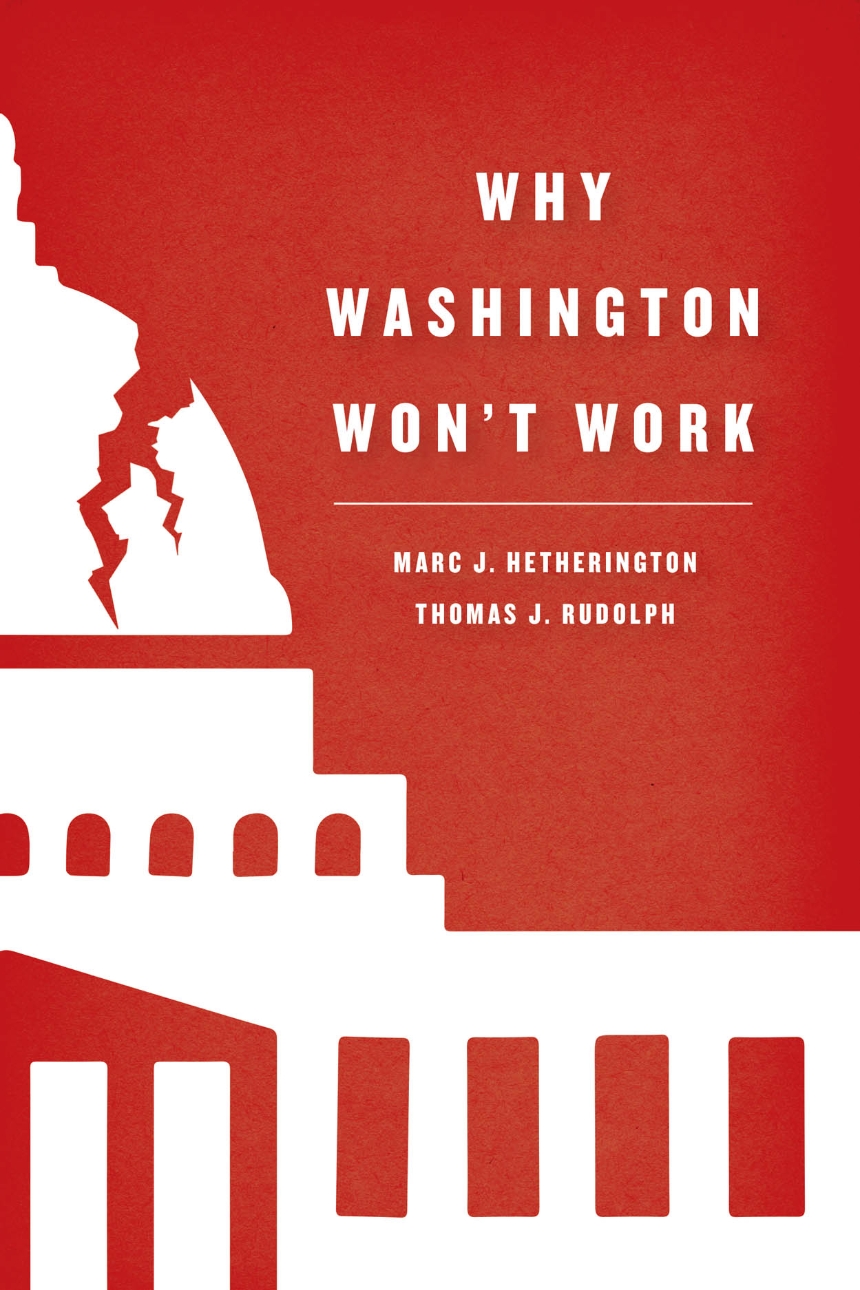Why Washington Won’t Work
Polarization, Political Trust, and the Governing Crisis
9780226299211
9780226299358
Why Washington Won’t Work
Polarization, Political Trust, and the Governing Crisis
Polarization is at an all-time high in the United States. But contrary to popular belief, Americans are polarized not so much in their policy preferences as in their feelings toward their political opponents: To an unprecedented degree, Republicans and Democrats simply do not like one another. No surprise that these deeply held negative feelings are central to the recent (also unprecedented) plunge in congressional productivity. The past three Congresses have gotten less done than any since scholars began measuring congressional productivity.
In Why Washington Won’t Work, Marc J. Hetherington and Thomas J. Rudolph argue that a contemporary crisis of trust—people whose party is out of power have almost no trust in a government run by the other side—has deadlocked Congress. On most issues, party leaders can convince their own party to support their positions. In order to pass legislation, however, they must also create consensus by persuading some portion of the opposing party to trust in their vision for the future. Without trust, consensus fails to develop and compromise does not occur. Up until recently, such trust could still usually be found among the opposition, but not anymore. Political trust, the authors show, is far from a stable characteristic. It’s actually highly variable and contingent on a variety of factors, including whether one’s party is in control, which part of the government one is dealing with, and which policies or events are most salient at the moment.
Political trust increases, for example, when the public is concerned with foreign policy—as in times of war—and it decreases in periods of weak economic performance. Hetherington and Rudolph do offer some suggestions about steps politicians and the public might take to increase political trust. Ultimately, however, they conclude that it is unlikely levels of political trust will significantly increase unless foreign concerns come to dominate and the economy is consistently strong.
In Why Washington Won’t Work, Marc J. Hetherington and Thomas J. Rudolph argue that a contemporary crisis of trust—people whose party is out of power have almost no trust in a government run by the other side—has deadlocked Congress. On most issues, party leaders can convince their own party to support their positions. In order to pass legislation, however, they must also create consensus by persuading some portion of the opposing party to trust in their vision for the future. Without trust, consensus fails to develop and compromise does not occur. Up until recently, such trust could still usually be found among the opposition, but not anymore. Political trust, the authors show, is far from a stable characteristic. It’s actually highly variable and contingent on a variety of factors, including whether one’s party is in control, which part of the government one is dealing with, and which policies or events are most salient at the moment.
Political trust increases, for example, when the public is concerned with foreign policy—as in times of war—and it decreases in periods of weak economic performance. Hetherington and Rudolph do offer some suggestions about steps politicians and the public might take to increase political trust. Ultimately, however, they conclude that it is unlikely levels of political trust will significantly increase unless foreign concerns come to dominate and the economy is consistently strong.
256 pages | 31 figures, 29 tables | 6 x 9 | © 2015
Chicago Studies in American Politics
Political Science: American Government and Politics, Political Behavior and Public Opinion
Reviews
Table of Contents
Acknowledgments
Chapter 1 Why Extreme Leaders Don’t Listen to a Moderate Public
Chapter 2 Polarization, Political Trust, and Institutional Responsiveness
Chapter 3 What Moves Political Trust
Chapter 4 How Political Trust Became Polarized
Chapter 5 How Priming Changes the Consequences of Political Trust
Chapter 6 Political Trust Can Help Conservatives, Too
Chapter 7 The Gordian Knot: A Bad Economy, Low Trust, and the Need for More Spending
Chapter 8 Political Trust and Flagging Support for Obamacare
Chapter 9 Can Things Change?
Chapter 10 Things Will Probably Get Better, but We Are Not Sure How
Notes
References
Index
Chapter 1 Why Extreme Leaders Don’t Listen to a Moderate Public
Chapter 2 Polarization, Political Trust, and Institutional Responsiveness
Chapter 3 What Moves Political Trust
Chapter 4 How Political Trust Became Polarized
Chapter 5 How Priming Changes the Consequences of Political Trust
Chapter 6 Political Trust Can Help Conservatives, Too
Chapter 7 The Gordian Knot: A Bad Economy, Low Trust, and the Need for More Spending
Chapter 8 Political Trust and Flagging Support for Obamacare
Chapter 9 Can Things Change?
Chapter 10 Things Will Probably Get Better, but We Are Not Sure How
Notes
References
Index
Awards
International Society of Political Psychology: Juliette and Alexander George Book Award
Won
